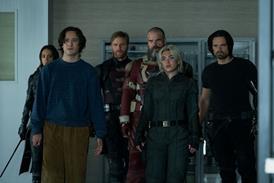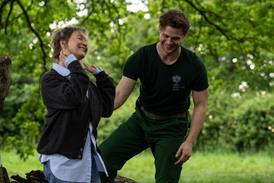Lucy Lawless makes her directorial debut with this unflinching look at combat photojournalist Margaret Moth

Dir: Lucy Lawless. New Zealand. 2023. 85mins
A stirring tribute to New Zealand photojournalist Margaret Moth, Never Look Away leans into its subject’s complexities, presenting viewers with a layered, intelligent study of a woman who lived unapologetically and ferociously, choosing to cover war zones rather than embrace a conventional existence. Actor Lucy Lawless’ directorial debut makes the late Moth, who died in 2010 at the age of 59, feel strikingly present by speaking with colleagues and lovers, who paint her as someone in thrall to the rush and moral urgency of capturing combat in unadorned terms.
In death, just as in life, it is impossible to take your eyes off her
After premiering at Sundance, the documentary screens at Hot Docs, with Kaleidoscope Films handling distribution for the UK and Greenwich Entertainment releasing in the US. Former Xena: Warrior Princess actor Lawless’ name will help attract audiences, as might the recent Civil War, which offers a fictional take on the harsh realities of combat photographers. Notable on-camera commentators such as news anchor Christiane Amanpour could also boost visibility.
As is mentioned by several of Never Look Away’s talking heads, Moth was a striking presence, her jet-black punk-rock hair indicative of her adventurous spirit. (In photos and video, she resembles an arresting mixture of Grace Slick and Joan Jett.) Born in New Zealand, she made her name after moving to America in the early 1980s, where she eventually became a CNN camerawoman. She flaunted a sex, drugs and rock ‘n’ roll lifestyle, gravitating to open romantic relationships, skydiving and heroin. But covering war zones quickly became Moth’s greatest addiction, whether it was the Gulf War or other 1990s conflicts in Sarajevo, Rwanda and Israel. Consumed by anger from a traumatic childhood she was desperate to escape, Moth was not interested in settling down, instead focusing all her energies on documenting the horror of combat.
When Moth first started to establish herself as a photojournalist, few women were working behind the camera — and this was back when she was covering local political stories in Houston, Texas, a few years before she joined CNN and started travelling the world. Never Look Away makes clear that she would not let sexism hold her back, yet Lawless also does an impressive job of weighing Moth’s battlefield rush with the sober recognition of the dangers of her work. Much like soldiers, war journalists find it difficult to return to civilian life after the fighting stops — no one back home can appreciate the job’s intoxicating mixture of exhilaration and fear — and Moth’s colleagues articulate those nuances in gripping terms.
Moth may have craved the adrenaline jolt that war provided but she was not foolish or reckless. Never Look Away persuasively argues that she never felt more alive than being close to death — a cliche in fictional war films, perhaps, but true of Moth and many of her colleagues.
Sadly, the inherent risks of her occupation eventually caught up with her when, in Sarajevo in the summer of 1992, she was struck by a sniper’s bullet. Her peers speak emotionally about their concern that she would die from her catastrophic facial injuries. (One of the film’s interview subjects, journalist Stefano Kotsonis, was in the same vehicle as Moth.) She survived, but her jaw had to be reconstructed, and she lost most of her teeth and part of her tongue, to the point that speaking would be nearly impossible for the rest of her life. Lawless celebrates Moth’s refusal to succumb to self-pity as this determined photojournalist eventually started covering war zones again, her fearlessness undiminished.
Contributions from ex-boyfriends leave no doubt that Moth was a difficult person to love — she insisted on having open relationships but did not take kindly to her partners engaging in the same behaviour. She was her own person, refusing to be tamed, but she could be needy and unreasonable when it came to matters of the heart. And yet, years after her death from cancer, Moth still evidently has a hold on her former lovers.
Watching Never Look Away, it is apparent that she had that effect on everyone. Margaret Moth was not her actual name — she changed it from Margaret Wilson, along with her hair colour, when she reinvented herself after leaving home — and the documentary acknowledges the unknowability of a blazing original who went to extremes as a matter of course. In death, just as in life, it is impossible to take your eyes off her.
Production company: Matthew Metcalfe Productions
International sales: Kaleidoscope sales@kaleidoscopefilmdistribution.com
Producers: Matthew Metcalfe, Tom Blackwell, Lucy Lawless
Screenplay: Matthew Metcalfe, Tom Blackwell, Whetham Allpress, Lucy Lawless
Cinematography: Darryl Ward, Richard Bluck
Editing: Whetham Allpress, Tim Woodhouse
Music: Jason Smith & Karl Solve Steven
























![The Brightest SunScreen[Courtesy HKIFF]](https://d1nslcd7m2225b.cloudfront.net/Pictures/100x67/3/5/0/1448350_thebrightestsunscreencourtesyhkiff_312678.jpg)









